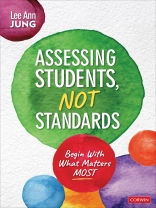See beyond content standards to the broader context of life-changing skills.
The standards-based learning and grading movement of the past twenty years has ushered in a critical shift in assessment that demands clarity in both what is being measured and how well students are learning. Seeing the value in this evolution, a wave of schools has invested enormous effort to institutionalize the policy and practices of the movement. In doing so, many focused their initial efforts squarely on grading and fell short of the more important work–classroom assessment. There are important lessons in these missteps and failures.
This groundbreaking, ‘next generation’ approach to classroom assessment challenges educators to reflect on the connections between growth, mastery, and student self-efficacy and to prioritize the transferable skills of metacognition and self-regulation in assessments. A powerful call-to-action, this guide includes:
- A conceptual framework that guides the questions and order of assessment reform
- An approach to assessment, grading, and reporting that prioritizes student growth over a standard definition of success for everyone
- Strategies to develop metacognition and catalyze motivation in students
- Orientation to each chapter with learning intentions with success criteria
- Vivid case stories and prompts to power deep reflection
Underscoring the importance of learning environments that work for the full range of learning profiles, this book calls for a revolution in the narrative around assessment and grading, emphasizing the ultimate goal of nurturing students who are metacognitive, expert learners, motivated by the joy of learning.
Tabella dei contenuti
Part One: Purpose & Culture
Part Two: Priorities
Part Three: Assessment Practices
Part Four: Grading Practices
Circa l’autore
Lee Ann Jung, Ph D, is founder of Lead Inclusion, Clinical Professor at San Diego State University, and a consultant to schools worldwide. A former special education teacher and administrator, Lee Ann now spends her time in schools, working shoulder-to-shoulder with teams in their efforts to improve systems and practice. She has consulted with schools in more than 30 countries and throughout the United States in the areas of universal design for learning, inclusion, intervention, and mastery assessment and grading. Lee Ann is the author of 7 books, numerous journal articles and book chapters on inclusion, universal design, and assessment. She serves on the advisory board for Mastery Transcript Consortium, as section editor of the Routledge Encyclopedia of Education, and on the editorial board member for several professional journals. In her community, Lee Ann is a board member for Life Adventure Center, a local nonprofit with a mission of healing for those who have experienced trauma.Bring Lee Ann Jung to your school or district! Learn more at Lead Inclusion.org












